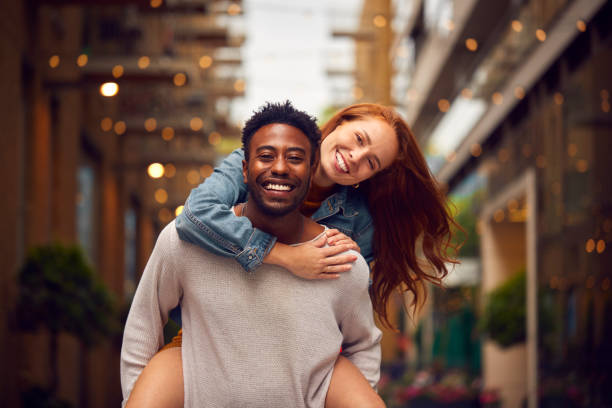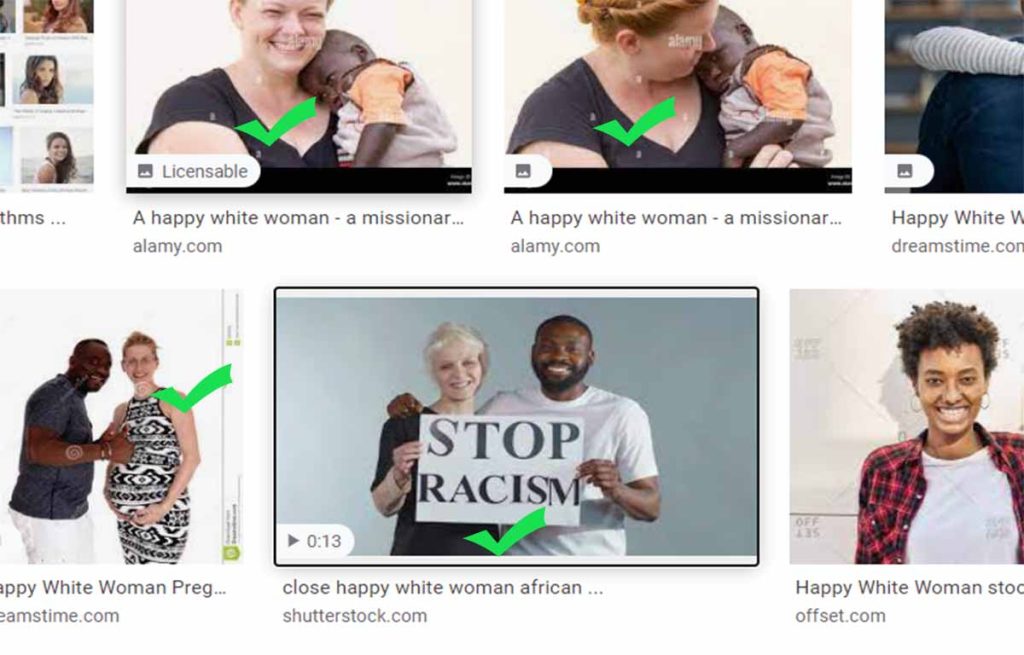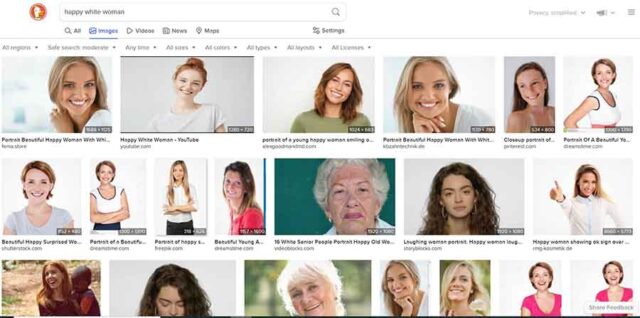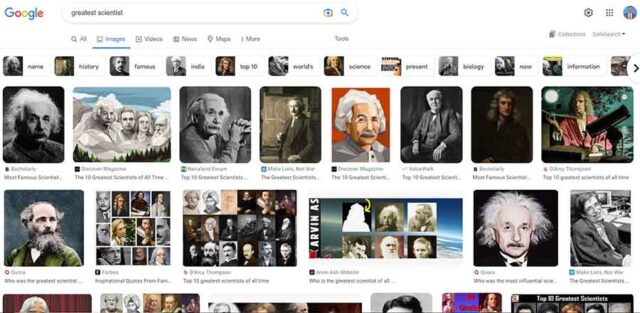
Recently people refuted the accuracy of ChatGPT, the new AI machine that has destabilized many people. Now more than ever, we are beginning to critically examine the capability of AI to replace humans in every vocation because the threat is getting more real. While several case studies have been used to demonstrate that humans are irreplaceable, a simple image search for “happy white woman” is still making the rounds.
Users once noted that an image search for “happy white woman” did not show a happy white woman in the top search results on Google. This raised a topic for debate on the internet at some point in time.
A Quora user once asked why there are unexpected results when “Happy White Women” is Googled. Here are some of the responses that followed:
“Google has a strong anti-White agenda. People try to claim it is just the “algorithm.” An algorithm is not pure artificial intelligence. It is basically just a crawler, and humans with their own agenda input what to look for. Most search engines are actually powered by Bing (such as DuckDuckGo), which does not have this strong anti-White agenda.”
Tom Thomson

Tom further added;
“They are trying to push an agenda. They hate White people. It’s OK to be White”.
While a simple question about why Google displayed black women instead of white women is not enough to bring in comments about racism, it is still important to critically evaluate the true intent behind why that is so.
Thus, instead of outrightly disagreeing with Tom on his “anti-white agenda” theory, I decided to thoroughly examine the evidence available for you and me to fully understand why the search results are so.
Could the multinational tech company be racist or be promoting black population groups over others? The more logical answer is to the contrary. Google would be more inclined to facilitate interracial unity or help fight racism.
On Googling “Happy White Woman”, below were the image search results. They were more in keeping with my initial hypothesis that Google would be more inclined to promote inter-racial unity as you can see harmonious combinations of white and black people.

Google’s algorithm is changing every now and then. To confirm if these results are still the same now, open your browser search and type in the phrase “happy white woman”. After it opens, click on the “images” tab to display only image results for the search phrase.
If you do that correctly, you should obtain the full image results as shown below:

There are several possible assumptions from the search results above.
- There is a glitch in Google’s algorithm that will be resolved soon.
- Google is indirectly inferring that the happiness of white women depends on black men.
- Google detected the search intent for the phrase to be racist and programmed the algorithm to show anti-racial results.
Due to the inconsistencies in the results, I decided to try out the related phrase “Happy black women” to see what results Google would display as well. Below are the results I got.

All the image search results for “happy black women” were consistent. There were no mixed images of white and black people as it was for “happy white women”. This, indeed, was enough to raise the debates about Google’s anti-white propaganda but there was no sufficient evidence to say that is true.
To further confirm what was going on, I compared search results for the same keywords on two other popular search engines – Bing and DuckDuckGo.
Bing and DuckDuckGo
Bing is known to be Google’s closest search engine rival. The same search keyword “happy white woman” on Bing Search gave the image result below.

DuckDuckGo is another search engine that claims to offer full privacy protection to users. It does not track users or offer results influenced by user bias or location. An image search for “happy white woman” on DuckDuckGo gave the following result.

Bing and DuckDuckGo’s results seem to be more consistent with the search phrase than those of Google. Does it therefore mean that Google truly has an anti-white agenda?
Here are some possible explanations why Google displays those search results for the key phrase:
- Search intent manipulation.
- Google may be biased, racist, and not to be trusted.
- AI algorithms, in general, may not be as intelligent as we think.
We will now look at these explanations in detail.
Search intent manipulation by BLM groups
Google is the foremost search engine used by almost everyone in the world today who has access to the internet. It has a large database of information organized by its search algorithm. Unfortunately, Google’s search algorithm is not fool’s proof.
When the question of “why these unexpected search results show up” was asked on Google Search Forum, a Platinum Product Expert on the Google Forum answered as follows;
Usually there are simple explanations such as the search engine has interpreted the word white to mean the background color, not the person’s color; but interpreted the word black to mean the person.
Regarding images, many of the results are from stock photo sites, and they categorize their content using themes (including sex, color, background color etc) that skew what you see in Google’s Image Search. Note that your question used the word “happy”, a concept often used as a category by stock photo sites, making it more likely the results will be full of stock photos.
Usually it’s about the language used, the specific wording of the query. Google indexes the wording of other websites, so its results tend to reflect societal prejudices, or just mirror the way words are commonly used in real life.
Bear in mind that some of the people sharing this question on social media, are not doing so with the best of intentions, and know full well it’s a trick of language. This question has repeatedly been asked by people who enjoy race baiting, but also by others who were tricked into being honestly outraged by a perceived racial bias.
One further thought: Google’s automated algorithms are not immune from the same prejudices as the rest of society.
This shows several things but it also demonstrates that special interest groups on the Radical Right could search for “Happy White Women” and repeatedly click on interracial pictures to prime Google search bias and use the search results as evidence against Google for BLM propaganda. From the explanation above, this could actually work on Google’s algorithm.
This proposition asserts that Google might be pushing BLM propaganda against destructive efforts by groups on the Radical Right, where it is programmed to display more racially friendly results when users search for keywords like “Happy White Woman” which may have been seen to have racial intents. And now, there is a counter-rise of race-baiters who claim Google is racist in favor of blacks.
David Junge, after thorough testing, found that there is no racial-based search intent associated with “happy white woman”. And if Google considers “happy white women” a means of race-baiting, we’d expect other search engines like Bing, DuckDuckGo, and Yahoo to pick it up as well, which apparently isn’t the case.
Google, itself, may be secretly pro-BLM
This is of course the most interesting argument of the Radical Right. They claim that since this occurrence of mixed race results for a search for “Happy White Women” is seen only with Google and not with other Search engines, Google may be directly involved in BLM propaganda.
They are not arguing that BLM groups have found a way to bias the search algorithm, but that Google is openly supporting BLM and minority groups.
However, this is very unlikely as Google would not intentionally alter its search results to promote any group. That would raise suspicion, queries, and litigations, and to think that Google would go ahead is extremely unlikely.
Here is another way to look at it. If Google is deliberately promoting BLM or minority groups, it should also be reflected in other related search keywords. For example, a search for “Greatest Scientist” should show more individuals in the minority groups if indeed Google is promoting such groups but it clearly does not, as shown in the image below.

Bear in mind that another similar allegation had been raised against Google in 2019, claiming that Google’s algorithm discriminates against black women and girls. In the publication, it was noted that a search for “girl” or “women” shows only white girls and women respectively.
The inconsistencies in the claims against Google show that there is no factual evidence to prove that Google is biased and intentionally promoting BLM and minority groups.
AI algorithms may not be as intelligent as we think
As depicted by the Google Forum expert above, the Google search algorithm, and by extension, all search engine algorithms, are not immune to society’s prejudices. More importantly, search algorithms can misunderstand what is being searched for based on how the images are categorized.
Most images used by many websites are obtained from stock image sites which may categorize their images inappropriately. The alternate “alt” text in images also describes what an image should be, and this also can be wrongly written.
Google, like other search engines, relies on this information to pull out results from its large database. The original categorization of a “mixed-race white women” image in a “white women” image category could influence how Google sees those images.
In addition to the search intent that I talked about earlier, results may reflect the signal received by Google as to what is the real reason behind the search, and hence display results based on what it perceives that people want to see more.
Lastly, Google’s AI algorithm may misinterpret the word “white” to mean background color and display happy women on a white background.
But whatever the case is, we now see that Google and other search algorithms may not be as intelligent as we thought them to be.
My thoughts on this matter
Most global brands use their influence to promote inter-racial unity, speak against political violence, child and women abuse, etc. Google is a global brand that might not want to be associated with any sociocultural violations like racism and others. This might lend credibility to the claim that Google could tweak its algorithm to be more socially inclusive, by gathering search data and understanding the intents for which searches are made relating to a particular topic.
Searching for “happy white woman” after hearing about the conspiracy that the results are showing some unexpected results, already influences your search intent – you want to confirm or refute the claims. This, in some ways, affects your interactions with the search results, a behavior Google can detect and adapt to modify future results about the search keyword.
Final words
Google search for ” Happy white woman” shows results with happy white women and a few black men. This behavior is not seen using other search engines like Bing and DuckDuckGo. This has raised controversy on the internet concerning how these search behaviors on Google may have a racial or BLM undertone.
Evidence examined so far has not shown any such bias. The most probable explanation is how search intents affect search results, and the role of image description in stock photo sites can determine what shows up for a given keyword phrase like “Happy white woman”.

















